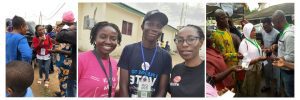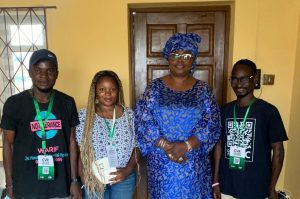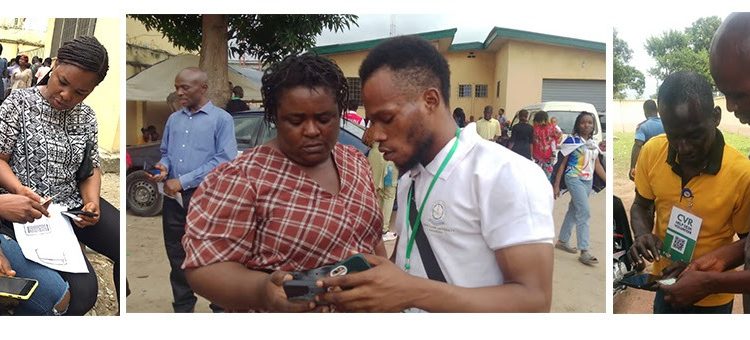So that she could exercise her franchise to vote in elections, Funmilayo Olopade registered at the Government Technical College 1 registration centre in Ikotun in 2019. She got a voter’s card at the Unit 027 polling centre, the one that was close to where she was living.
But due to a change in environment, she sought to transfer her polling unit from Ikotun to Unit 147 polling center at Matthew Ojo junction, where she is now relocated. Both polling units are within Alimosho local government area of Lagos state.
However, Olopade was taken aback by the huge crowd she saw on the ground when she visited the Ikotun office of the Independent National Electoral Commission to initiate the transfer process.
But with the help of a volunteer and EiE staff, Seun Akinyemi, out of the many deployed by Enough is Enough (EiE) Nigeria, to coordinate crowds and educate people at various flashpoints of Continuous Voters Registration in Lagos, Gombe, Oyo, Anambra, Ondo, Imo, Nassarawa, Taraba, Bayelsa and the Federal Capital Territory (FCT), the job was made easy.
“I registered for the 2015 General Elections at Ikotun, but when I changed where I live, I decided to do a transfer of my polling unit. When I got to the INEC local government office at Alimosho local government in Ikotun, I thought I wouldn’t be able to do it because the crowd was too much but one of the EiE volunteers helped me to do it on his phone and forwarded the slip to me via WhatsApp.
“He asked me to go to a business centre to print and wait for an update from INEC on picking up the PVC. If not for the volunteer, I would not be able to do the transfer,” said Olopade.
Her experience was similar to that of Tosin Olalekan, another beneficiary of the EiE project; t Mr. David Ayodele, the Project Manager for the interventionist organisation said the project leveraged the network of volunteers across the country to help citizens use simple technology tools such as smartphones, tablets, and computers to ease the process of Continuous Voters Registration in those states. Olalekan asserted that she was able to complete her transfer process because of the project.
“INEC brought the registration exercise to my ward and I wanted to do a transfer of my voter’s card only. The person that wanted to assist me requested money, so, it was only my husband that did his own.
“I was happy the volunteers could help me with the transfer. They also assisted my neighbours to resolve other issues like information updates and transfers. My neighbours wouldn’t have done it because they did not want to leave their shops and face the crowd at the INEC office,” Olalekan said.

This is how the EiE helped many fresh registrants, who because of the communication gap between the INEC and the citizens, could have lost the right to vote in the 2023 General Elections.
Democratic governance is an essential condition for promoting good governance in any society; but elections are the building blocks to sustain democratic governance. It helps to facilitate leadership succession, promotion of accountability, and citizens’ participation.
According to the Independent National Electoral Commission (INEC), voter turnout across Nigeria hovered around 30 – 35% of registered voters in the last two electoral cycles.
Since the downward spiral of economic realities and more recently, the #EndSARS protests in Nigeria, more youths in the country are beginning to embrace political activism through virtual campaigns, physical protest and championing Permanent Voters Card (PVC) registration.
Participating in the electoral process in Nigeria requires citizens to have a Permanent Voters Card (PVC), those who do not have are expected to register during the CVR exercise.
As part of the efforts of the INEC to ease the process, a portal was set up for those who wanted to do new registration and those that wanted to resolve issues of lost and damaged PVCs, information updates as well as the transfer of details from one polling unit to another.
But due to the communication gap, many did not know that only fresh registrants needed to be at the INEC office to complete their registration. If it is a transfer of PVC, update of information or application for a new card due to loss or damage of the old one, such could be done on the INEC portal, without necessarily visiting the office.
Surprisingly, people trooped to INEC’s offices across the country, making the population at the registration points/offices huge, such that it was impossible for INEC’s staff to attend to them. Most applicants got frustrated and would not be able to register for the CVR if they had to join the queue.
But in July 2022, the last month for the registration, EiE engaged partners in the 9 states and the FCT to coordinate the crowd, educate people with the intent to replace lost cards, transfer details and update information on how to resolve these without joining the queues.
The volunteers would also assist those that were not technology savvy on how to use their phones to resolve the issues. In the end, 36 local government areas were identified across the focus states, where the EiE recruited and trained 86 volunteers.
With the permission of the INEC, EiE and partners deployed the volunteers to these identified flashpoints. The project, which commenced on July 25, and ended on July 31, 2022, successfully assisted over 8000 citizens to resolve issues related to the CVR exercise.
Ms. Nike Oriowo, Public Relations Officer of the INEC in Lagos acknowledged how the intervention helped the electoral body to deliver on its mandate at such a last-minute rush.

She said “The commission is always ready to collaborate with credible NGOs in Nigeria to improve the electoral process and make it seamless for citizens. A lot of people are used to doing things at the last minute, so the crowd almost tripled during the final week of the CVR exercise. However, the effort of the EIE and its volunteers to reduce the burden on INEC staff is quite commendable.
“The upcoming general election is for all of us and all hands must be on deck to make it work”.
As a way of appreciating the efforts, an INEC official in Ojo local government area of Lagos State dished out a token to each of the volunteers. working with them to appreciate their support during the exercise.
Ayodele, the Project Manager said “we saw the true Nigerian spirit. The ones who came to confirm that their PVCs are still valid, some others told us stories of how they’d dedicated an entire day to ensure they participated in the process successfully and many others joined our volunteers to organise the crowd and provided the support that they needed on the field.
“At the end of each day, we receive several reports of willing citizens that offered to donate to volunteers to make the process easier for them. It is evident that there is a lack of trust between the commission and the citizens.
“However, after a few days of engagement on the field, many citizens were able to gain trust in the process and got the help that they needed,” said the EiE senior official.
Sharing the same sentiment, one of the volunteers engaged by the EiE in Akwanga, Nasarawa State, Kabiru Samu Ado noted that he benefited from the project because he was able to leverage the relationship he established with INEC officials during the project for other civic engagements, especially the PVC collection advocacy project he is coordinating.
“The 2023 general election is fast approaching, citizens have registered and INEC also needs to do their bit by providing PVCs to citizens early.
“CSOs should work with INEC to ensure registered voters come out to pick up their PVCs. It is not just about picking up the PVCs as an official means of identification, they must use them to vote on election day.
“An election is a game of numbers; the higher the voter turnout, the more the final results represent the people’s wishes and bring legitimacy to governance,” the volunteer said.
Despite its impact, the initiative is limited in scope as it covers just 8 states and FCT out of 36 states across the country.
Ayodele, EiE’s Project manager explained that the project was implemented in states where EiE has active partners, as the initiative was not funded, for it to be executed across the country.
This story has been made possible by Nigeria Health Watch with support from the Solutions Journalism Network, a nonprofit organization dedicated to rigorous and compelling reporting about responses to social problems.

